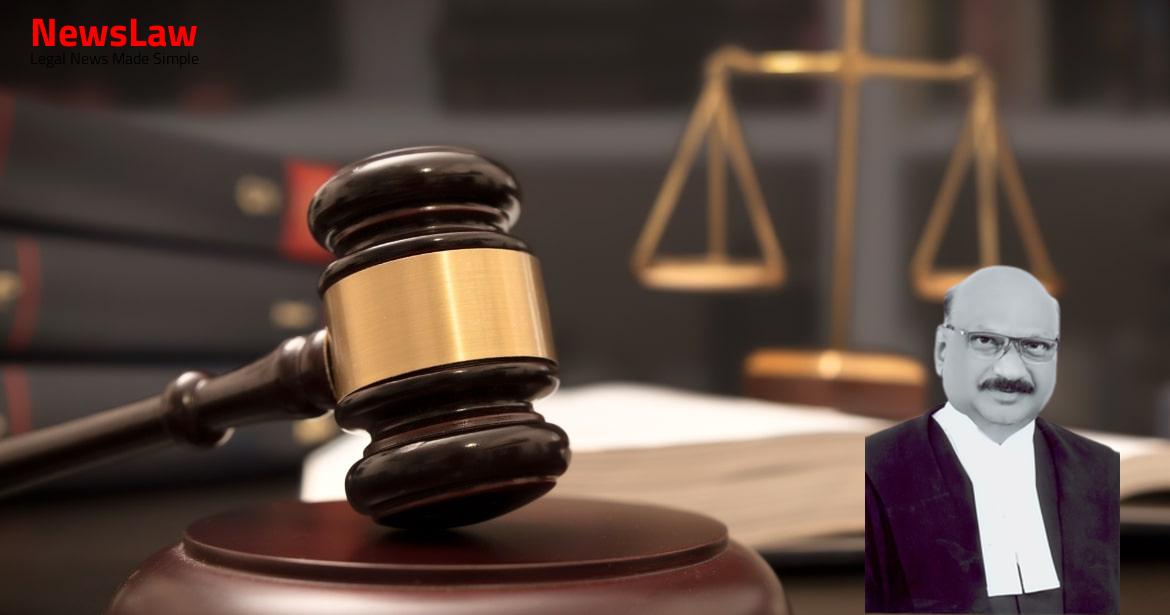In a recent legal case before the Supreme Court of India, the interpretation of Customs Valuation Rules was crucial in the matter between Indusind Media & Communication Ltd. and the Commissioner of Customs. The judgment delves into the nuances of valuation rules and their application in determining the transaction value of imported goods. Stay informed on this landmark decision!
Facts
- The appellant imported goods and filed Bill of Entry No.260085 dated 26.06.2003 at Air Cargo Complex, New Delhi.
- The goods were declared as Multiplexor Satellite Receivers, test and measurement equipment, etc., covering 19 items.
- The investigation revealed that the importer had mis-declared the value of the imported goods at Delhi and Mumbai.
- They suppressed the value of embedded software and services payable to the foreign supplier.
- The importer had revised the purchase order to show as CIF instead of FOB.
- Show Cause Notice dated 27.06.2014 was issued by the Department, stating inter alia the intentional undervaluation and misdeclaration by the importer.
- Both the importer and another party were held liable for penalty under Section 114AA of the Customs Act, 1962.
- The Principal Commissioner of Customs (Import) redetermined the value of imported goods under Rule 9(1)(e) as US $ 361,633 CIF.
- The provisional assessment made was finalized under Section 18 of the Customs Act based on revised values and classification.
- A demand for differential duty amounting to Rs.54,19,475 was confirmed.
- Different equipments were ordered but meant to be interconnected to perform a common function of ‘Head End’
- Goods were found to be covered under heading 8525 instead of heading 8543
- Reliance was placed on SET India Pvt. Ltd. vs Commissioner of Customs, Cochin and Commissioner of Customs vs Multi Screen Media Private Limited
- Valuation issue considered with focus on purchase order requiring software to be embedded in equipment before supply
- Observation made under Sub-Rule (iii) of Rule 10 of the Customs Valuation Rules 2007 regarding incorporation of software in imported goods
- Mis-declaration in valuation led to liability for confiscation under section 111 of the Customs Act and imposition of penalty of Rs.15,00,000 on Indusind Media & Communication Ltd.
Arguments
- The imports and Bill of Entry in the instant case were of the year 2003 and 2007 Rules would not apply.
- Activities like engaging services for appropriate software that resulted in embedding cards in items of import were considered post-import activities and could not be included in valuation.
- The respondent refuted all contentions of the appellant.
- The dominant intent of the invoices had to be seen to determine if the intended use was individual items or collectively as part of one apparatus.
- Note 4 to Section XVI would provide guidance in such instances.
Also Read: CRPF Act: Validity of Rule 27 for Compulsory Retirement – Case of Head Constable vs. CRPF
Analysis
- The Department invoked Note 4 to Section XVI to classify imported items as part of one apparatus/machine for the appropriate heading.
- Rule 3 of the Customs Valuation Rules provides for method of valuation based on case facts.
- The Appellant, as a Multi System Operator, imported equipment necessary for receiving, decoding, and unscrambling signals.
- The components included Encoders, IRD’s, Power Vu Receivers, and Encryption System.
- The function of the Head End could not be achieved without these components working together.
- The software embedded through cards in the main unit was essential and not a post-importation activity.
- Rule 9 of 1988 Rules was appropriate in determining the transaction value of imported goods.
- Classification of goods under Tariff Item 8525 by the Tribunal was unchallenged.
- Customs duty assessment must be directly related to the value of goods payable at importation.
- Distinct treatment between pre-import charges and post-import charges was emphasized.
- Software cards were embedded during importation, not added post-import.
- Value for imported goods related to payment conditions of sale at importation.
- Note 4 in Section XVI of the Act plays a significant role in classifying imported goods.
- Consideration of charges levied before importation for transaction value calculation.
- Appellant’s primary submission on classification of 19 items imported under one Bill of Entry.
- Rule 9(1)(b) of 1988 Rules adds value of materials incorporated in imported goods.
- CESTAT’s oversight on Appellant’s submission regarding individual classification of imported items.
- Distinction between pre-import and post-import charges emphasized in Essar Gujarat Ltd. case.
- Rule 10 of 2007 Rules explanatory nature consistent with Rule 9 of 1988 Rules.
- Section XVI of the Customs Rules deals with machinery, mechanical appliances, electrical equipment, and related parts.
- Tariff Item 8525 in Chapter 85 pertains to transmission apparatus for radio telephony, broadcasting, and cameras.
- Transaction value for imported goods is determined as the price paid for the goods adjusted according to Rule 9.
- Rule 9 specifies the costs and services to be added to the transaction value, such as commissions, packaging costs, and royalties.
- The determination of transaction value is crucial in customs valuation and must adhere to the specified rules.
- In the case of Commissioner of Customs, New Delhi v. Prodelin India (P) Ltd., it was held that technical know-how fee should not be added to the value of imported goods.
- The Tribunal found that in the current case, software had to be embedded in the equipment supplied.
- The observations in Essar Gujarat Ltd. should be understood in the context of the specific facts of that case.
- Subsequent decisions like Commissioner of Customs, Ahmedabad vs. Essar Steel Ltd. and Commissioner of Customs (Import), Mumbai vs. Hindalco Industries Ltd. have also emphasized that technical agreements related to post-importation activities.
- Previous decisions by the Court have held that post-importation service charges should not impact transaction value.
- The law laid down in Essar Gujarat Ltd. and J.K. Corpn. Ltd. is clear and explicit.
- Essar Gujarat Ltd. was decided based on specific facts and the transfer of a plant with technical know-how and services.
- Rule 9 is similar to Rule 10 of 2007 Rules.
- The governing rule being Rule 9 of 1988 Rules does not impact the final analysis.
Also Read: DAMEPL vs. DMRC: Curative Petition and Arbitral Award Restoration
Decision
- The view taken by the Tribunal was affirmed by the decision of this appeal.
- The appeal was dismissed.
- No order was given in relation to costs.
Case Title: INDUSIND MEDIA AND COMMUNICATIONS LTD. Vs. COMMISSIONER OF CUSTOMS NEW DELHI
Case Number: C.A. No.-002498 / 2018



